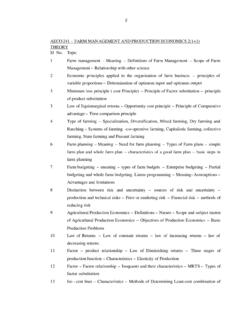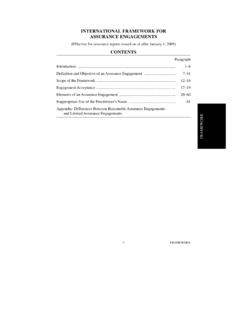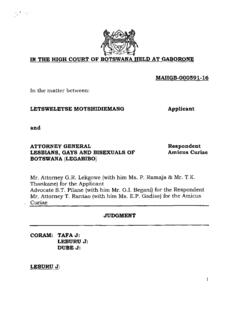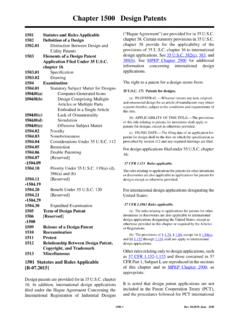Transcription of Lecture no.1 Economics Meaning, Definitions, Subject ...
1 2. Lecture Economics Meaning, Definitions, Subject matter of Economics Traditional approach consumption, production, exchange and distribution Economics . Economics is popularly known as the Queen of Social Sciences . It studies economic activities of a man living in a society. Economic activities are those activities, which are concerned with the efficient use of scarce means that can satisfy the wants of man. After the basic needs viz., food, shelter and clothing have been satisfied, the priorities shift towards other wants. Human wants are unlimited, in the sense, that as soon as one want is satisfied another crops up. Most of the means of satisfying these wants are limited, because their supply is less than demand.
2 These means have alternative uses; there emerge a problem of choice. Resources being scarce in nature ought to be utilized productively within the available means to derive maximum satisfaction. The knowledge of Economics guides us in making effective decisions. The Subject matter of Economics is concerned with wants, efforts and satisfaction. In other words, it deals with decisions regarding the commodities and services to be produced in the economy, how to produce them most economically and how to provide for the growth of the economy. Subject matter of Economics Economics has Subject mater of its own . Economics tells how a man utilises his limited resources for the satisfaction of unlimited wants.
3 Man has limited amount of time and money. He should spend time and money in such away that he derives maximum satisfaction. A man wants food, clothing and shelter. To get these things he must have money. For getting money he must make an effort. Effort leads to satisfaction. Thus, wants- efforts- satisfaction sums up the Subject mater of Economics initially in a primitive society where the connection between wants efforts and satisfaction is direct . Divisions of Economics The Subject matter of Economics can be explained under two approaches viz., Traditional approach and Modern approach. Traditional Approach It considered Economics as a science of wealth and divided it into four divisions viz.
4 , consumption, production, exchange and distribution 1. Consumption: It means the use of wealth to satisfy human wants. It also means the destruction of utility or use of commodities and services to satisfy human wants. 2. Production: It is defined as the creation of utility. It involves the processes and methods employed in transformation of tangible inputs (raw materials, semi- 3. finished goods, or subassemblies) and intangible inputs (ideas, information, know -how) into goods or services. 3. Exchange: It implies the transfer of goods from one person to the other. It may occur among individuals or countries. The exchange of goods leads to an increase in the welfare of the individuals through creation of higher utilities for goods and services.
5 4. Distribution: Distribution refers to sharing of wealth that is produced among the different factors of production .It refers to personal distribution and functional distribution of income. Personal distribution relates to the forces governing the distribution of income and wealth among the various individuals of a country. Functional distribution or factor share distribution explains the share of total income received by each factor of production viz., land, labour, capital and organisation. Lecture Modern Approach Microeconomics and macroeconomics - Methods of economic investigation Deduction & , Induction Modern Approach : This approach divides Subject matter of Economics into two divisions , micro Economics and macro Economics .
6 The terms micro- and macro- Economics were first coined and used by Ragnar Frisch in 1933. 1. Micro- Economics or Price Theory: The term micro- Economics is derived from the Greek word micro , which means small or a millionth part. It is also known as price theory . It is an analysis of the behaviour of small decision-making unit, such as a firm, or an industry, or a consumer, etc. It studies only the employment in a firm or in an industry. It also studies the flow of economic resources or factors of production from the resource owners to business firms and the flow of goods and services from the business firms to households. It studies the composition of such flows and how the prices of goods and services in the flow are determined.
7 A noteworthy feature of micro-approach is that, while conducting economic analysis on a micro basis, generally an assumption of full employment in the economy as a whole is made. On that assumption, the economic problem is mainly that of resource allocation or of theory of price. Importance of Micro- Economics : Micro- Economics occupies a very important place in the study of economic theory. Functioning of free enterprise economy: It explains the functioning of a free enterprise economy. It tells us how millions of consumers and producers in an economy take decisions about the allocation of productive resources among millions of goods and services.
8 4. Distribution of goods and services: It also explains how through market mechanism goods and services produced in the economy are distributed. Determination of prices: It also explains the determination of the relative prices of various products and productive services. Efficiency in consumption and production: It explains the conditions of efficiency both in consumption and production. Formulation of economic policies: It helps in the formulation of economic policies calculated to promote efficiency in production and the welfare of the masses. Limitations of Micro- Economics : Micro-economic analysis suffers from certain limitations: It does not give an idea of the functioning of the economy as a whole.
9 It fails to analyse the aggregate employment level of the economy, aggregate demand, inflation, gross domestic product, etc. It assumes the existence of full employment in the whole economy, which is practically impossible. 2. Macro- Economics or Theory of Income and Employment: The term macro- Economics is derived from the Greek word macro , which means large . Macro- Economics is an analysis of aggregates and averages pertaing to the entire economy, such as national income, gross domestic product, total employment, total output, total consumption, aggregate demand, aggregate supply, etc. Macro- Economics looks to the nation's total economic activity to determine economic policy and promote economic progress.
10 Importance of Macro- Economics : It is helpful in understanding the functioning of a complicated economic system. It also studies the functioning of global economy. With growth of globalisation and WTO regime, the study of macro- Economics has become more important. It is very important in the formulation of useful economic policies for the nation to remove the problems of unemployment, inflation, rising prices and poverty. Through macro- Economics , the national income can be estimated and regulated. The per capita income and the people s living standard are also estimated through macro- economic study. Limitations of Macro- Economics : Individual is ignored altogether.








